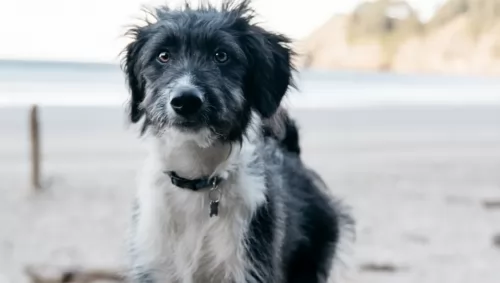 Petzlover
Petzlover Bouvier des Flandres is originated from Belgium but Bordoodle is originated from United States. Bouvier des Flandres may grow 15 cm / 6 inches higher than Bordoodle. Bouvier des Flandres may weigh 25 kg / 56 pounds more than Bordoodle. Bouvier des Flandres may live 3 years less than Bordoodle. Bouvier des Flandres may have more litter size than Bordoodle. Bouvier des Flandres requires Moderate Maintenance. But Bordoodle requires Low Maintenance
Bouvier des Flandres is originated from Belgium but Bordoodle is originated from United States. Bouvier des Flandres may grow 15 cm / 6 inches higher than Bordoodle. Bouvier des Flandres may weigh 25 kg / 56 pounds more than Bordoodle. Bouvier des Flandres may live 3 years less than Bordoodle. Bouvier des Flandres may have more litter size than Bordoodle. Bouvier des Flandres requires Moderate Maintenance. But Bordoodle requires Low Maintenance
 These large dogs have descended from Flemish cattle dogs, and in French, the word Bouvier means herdsman or cattle herder. This is because the dog was used for driving cattle. The Bouvier comes from the Flemish region of Belgium where it was bred as a working farm dog. It is believed that the breed may have come from crossing local farm dogs with imported Irish Wolfhounds, Schnauzers, Tibetan Mastiffs, Brabanters, Griffons and Beaucerons.
These large dogs have descended from Flemish cattle dogs, and in French, the word Bouvier means herdsman or cattle herder. This is because the dog was used for driving cattle. The Bouvier comes from the Flemish region of Belgium where it was bred as a working farm dog. It is believed that the breed may have come from crossing local farm dogs with imported Irish Wolfhounds, Schnauzers, Tibetan Mastiffs, Brabanters, Griffons and Beaucerons.
It was in 1910 that the first Bouviers appeared at the international dog show in Brussels, with a standard for the breed being adopted in 1912.The American Kennel Club recognized the dog in 1929. It was after World War 11 that Bouviers were brought to America and the American Bouvier des Flandres Club was founded in 1963.
 Known also as a Borderpoo or Borderdoodle, the Bordoodle is a designer- or hybrid breed which hails from the United States of America.
Known also as a Borderpoo or Borderdoodle, the Bordoodle is a designer- or hybrid breed which hails from the United States of America.
Both the dogs used in the development of this cross-breed are the Poodle and the Border Collie, and both these dog breeds have their own lengthy histories.
The history of the Bordoodle is short, as it is a modern crossbreed which has been purposefully bred by breeders to bring about a dog with certain looks and temperament.
 The Bouvier is a large compact, well built dog with strong muscled limbs. He stands at roughly 59 to 70 cm high at the withers, weighing between 27 and 52 kg. He has a large head with a thick and abundant coat which is of rough appearance. The coat is mostly black, but you’ll also find a range of other shades such as brindle, grey and fawn.
The Bouvier is a large compact, well built dog with strong muscled limbs. He stands at roughly 59 to 70 cm high at the withers, weighing between 27 and 52 kg. He has a large head with a thick and abundant coat which is of rough appearance. The coat is mostly black, but you’ll also find a range of other shades such as brindle, grey and fawn.
The back of the dog is level and broad, and is typically wider in female dogs. The back legs are strong and muscular. Some Bouvier des Flandres are born tail-less and this is most attractive. Most Bouvier dog owners used to have the tails docked because of the excellent appearance, but with docking now being banned, the tail is kept long. The muzzle is wide, the nose large, the eyes dark brown and the ears high set and floppy.
The Bouvier is intelligent, energetic and full of confidence while being calm and balanced in temperament. The puppies are vocal and full of antics, but as the Bouvier grows into adulthood, he mellows and becomes a steady family friend who gets on well with each human family member. He loves spending time with his family and becomes both friend and guardian, making a good watchdog too.
 The Bordoodle isn’t a purebred dog but is a cross between a Poodle and a Border Collie.
The Bordoodle isn’t a purebred dog but is a cross between a Poodle and a Border Collie.
He has a soft, medium length coat which is inclined to be wavy. Colors are essentially black and white but chocolate, cream, fawn, merle and grey are also seen.
He is a medium sized dog standing at between 38cm and 55cm and weighing between 13kg and 27kg. The long tail is feathery, the ears floppy or semi-erect and the brown eyes are bright and intelligent. The muzzle is medium to long.
As with any mixed breed dog, the Bordoodle can take after either parent dog but generally the Borderdoodle will be a medium sized dog.
With the Bordoodle you can expect nothing less than a highly intelligent dog. That is because both the Poodle and the Border Collie are super intelligent dogs so the Bordoodle is guaranteed to have got a good portion of this intelligence from both breeds.
It makes training and socialization easy for the dog. It is important for your Bordoodle to be trained and socialized if you want him to be obedient and relaxed around strangers and other pets. As it is, his amicable nature makes the hybrid dog of yours a great family pet – getting on well with other pets in the home as well as with children.
Apart from being such a smart dog, the Bordoodle is active, playful, loving and devoted – everything a serious dog owner wants in a pet. This is a dog that doesn’t really know the meaning of the word aggressive.
 The Bouvier is such an amicable dog and strong and energetic too. He makes the most marvellous companion and will happily adapt to life in the city or in the country, although, with his big size, he is better suited to a home where there is enough space to run around in.
The Bouvier is such an amicable dog and strong and energetic too. He makes the most marvellous companion and will happily adapt to life in the city or in the country, although, with his big size, he is better suited to a home where there is enough space to run around in.
He is loyal, loving and protective and when you make sure to make him an active part of your family, you’ll find in him all the characteristics of a true friend.
 Bordoodles have two great dog breeds to thank for the way they turn out. When you think of the Border Collie and Poodle, you know you’re going to get a dog that is friendly, social, playful, loving and devoted – the ideal family pet.
Bordoodles have two great dog breeds to thank for the way they turn out. When you think of the Border Collie and Poodle, you know you’re going to get a dog that is friendly, social, playful, loving and devoted – the ideal family pet.
Intelligent, he is easy to train too, and with excellent care, you’re going to have a most wonderful family pet and companion, full of fun and life.
 The big teddy-bear of a dog is a healthy breed, but as a large dog, you will need to look out for certain health problems with him.
The big teddy-bear of a dog is a healthy breed, but as a large dog, you will need to look out for certain health problems with him.
Xrays have been done on many Bouvier des Flandres by the Club and by the Orthopedic Foundation of America and it has been found that a significant percentage of Bouviers were dysplastic. Hip dysplasia is a deformity of the hip joint and many large breed dogs battle with this. It can be very sad for dog lovers as they watch their dog battling to get up after lying down and sometimes lameness in the hind legs.
Dental disease is a common problem in many dogs, and the Bouvier isn’t excluded one bit. If you don’t brush your pet’s teeth with special dog toothpaste and toothbrush, there is tartar build-up which can lead to bad breath and gum infection. Dental disease can lead to pain in the teeth and even the loss of teeth. Bad teeth affect the entire body, and the heart, kidneys and joints can all be negatively affected.
The Bouvier is a large dog prone to obesity. This is a serious disease that can lead to all kinds of digestive disorders, back pain as well as heart disease. It can be easy just to give in to your pet’s pleading eyes, but in the long run, excessive weight can spell a host of health problems.
 Bordoodles, when well cared for, can live to be 12-15 years of age. There aren’t going to be many health issues to contend with with your Bordoodle as there are no known health problems in this robust breed.
Bordoodles, when well cared for, can live to be 12-15 years of age. There aren’t going to be many health issues to contend with with your Bordoodle as there are no known health problems in this robust breed.
Nonetheless there are some common dog illnesses that you need to be aware of such as progressive retinal atrophy, hip dysplasia and hypothyroidism.
With hypothyroidism, the thyroid gland in the neck of your pet produces a hormone known as thyroxine that controls metabolism, but the disease hypothyroidism makes it that the gland doesn’t make enough thyroxine. Signs that your dog has this illness includes a dull coat, inflamed skin and even hair loss.
Get him to the vet immediately who will do blood tests and provide treatment. Mercifully it isn’t something that is life-threatening.
 Your Bouvier is an intelligent, independent dog and you will be doing him a favor by having him socialized and trained. He becomes such a pleasure to have around, being obedient and willing to respond to your commands.
Your Bouvier is an intelligent, independent dog and you will be doing him a favor by having him socialized and trained. He becomes such a pleasure to have around, being obedient and willing to respond to your commands.
Every dog, and particularly large dogs like the Bouvier, should be able to rely on a daily walk, a run in the park or on the farm and have special games from his owner. Not only does participating in activities together build a strong bond between dog and owner, its important to avoid boredom and frustration with your dog. You bought him so you therefore have a responsibility toward him.
Your Bouvier des Flandres has a thick, medium-length coat that gets a shaggy look to it. The breed needs regular brushing every second day or so to get rid of loose hairs and to prevent the hair matting. He will require some professional grooming to look and feel his best. With his thick coat, he is hypoallergenic which can be a relief for allergy sufferers.
The Bouvier has to be on high-quality dog food, whether you give him home-made food or commercially manufactured food. It has to have the right amount of vitamins and minerals. If you’re unsure about feeding a dog, remember that the amount and type of food you give your pet must be appropriate to your dog’s age, size and energy levels.It can also be wise to know which human foods are bad. Speak to your vet about your dog – they are a minefield of useful information about your pet. Fresh, cool water should be be available at all times.
 The Bordoodle is a dog which doesn’t shed that much so his grooming requirements are low and he is considered as a hypoallergenic dog.
The Bordoodle is a dog which doesn’t shed that much so his grooming requirements are low and he is considered as a hypoallergenic dog.
He will need to have his coat brushed at least twice a week to keep it shiny, soft and smooth. Depending on how your Bordoodle turns out, he may even require trimming at a professional groomer.
Make time to check his ears inside and out and learn how to clean the inside of his ears to avoid infection and wax build-up.
Dental hygiene is also imperative in dogs, and neglecting to do this will mean food particles and bacteria accumulating along your pet’s gumline, resulting in gingivitis and periodontal disease.
Every dog will require regular exercise and you can get your Bordoodle to join you in your walks. He is the kind of dog that can happily adjust to city or country life, but he will still need to have some ball games and other activities to keep him busy and happy.
He isn’t a dog that can be left alone day after day in the backyard. He is social and playful and loves the companionship of his human family.
If you feed your Bordoodle kibble from some of the top quality commercially produced foods, always research the dog food and take a good look at the ingredients.
The pet food you choose plays an important role in the longevity of your pet. There are commercially manufactured foods that have such poor ingredients that they can actually shorten your pet’s lifespan and cause stress to the kidneys and liver.
If in any doubt about what to feed your Bordoodle, speak to your vet. Cooked brown rice, cooked vegetables and cooked chicken can sometimes be mixed into your pet’s kibble. Raw meat should also occasionally be added in to ward off skin allergies.